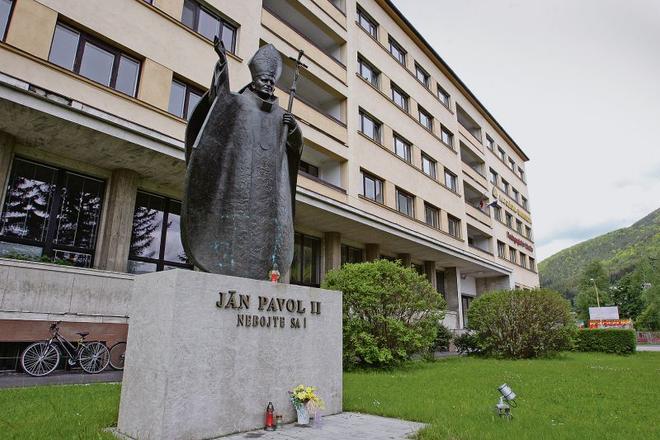AFTER the dubious use of cars, suspicious awarding of post-doctoral degrees and the discovery of an unsupervised slush fund the Catholic University in Ružomberok (KU) is facing another potential scandal, as the Nový Čas tabloid daily reports that six university employees received €114,028 in bonuses in 2013.
“Despite the fact that those are bonuses for 2013 and current management of Catholic University entered [office] in June 2014, it will deal with this issue,” says the KU management statement, as quoted by the SITA newswire.
According to Nový Čas, Dean of the KU’s Faculty of Philosophy Marian Kuna signed the bonuses ranging from €10,000 to €30,000.
“Those are persons whose monthly salary is a combination of tariff payment and personal bonus, [which is] usually at the maximum possible level,” former KU rector Tadeusz Zasepa said, as quoted by SITA. “Altogether Marian Kuna paid €243,311 in the form of bonuses for 85 employees in 2013; on average, each employee got bonuses in the amount of €2,862.”
He added that six employees therefore got one half of the money allocated for 85 people while deans of other faculties at KU paid just one third of the same sum in the form of bonuses to their employees.
“We are of the opinion that there was a sensationalising of the salaries of some of our employees that appeared in tabloid media and that it was in turn taken up also by some more serious media is against the respective legislation,” reads a statement from management. “We find it appropriate to wait for the result of the audit ordered by the university founder, which will properly review all the relevant circumstances.”
The Conference of Bishops of Slovakia (KBS), which founded the university, will send an auditing firm to investigate the case. It is not clear whether the audit will be related to all university workplaces.
“I can confirm that audit will be conducted but we will not publish any particulars,” said KBS spokesman Jozef Kováčik, as quoted by the Pravda daily.
Scandal after scandal
Previous internal inspections and audit of external firm revealed several instances of possible fraud, according to private broadcaster TA3, citing documents which it has at its disposal. Police have also investigated, they said.
“Currently there is an ongoing investigation of six criminal subjects,” Police spokeswoman Jana Baloghová said on November 6, as quoted by TA3. “In this stage of the procedure, it is not possible to comment on the investigation process or particular facts.”
One example cited by TA3 points to courses which were meant to last five years being completed in six months via forged official documents. The Plus Jeden Deň tabloid daily reported that there were 22 off-campus study graduates who finished sooner than the standard length of study in 2012.
Plus Jeden Deň also reported that there was an inappropriately high number of post-doctoral degrees awarded in a short period, with many of the recipients hailing from Poland. Polish media has reported on the case pointing to fees at the university violating the law and forging of official documents about their payments, according to daily.
The daily also reported on the shady use of business cars revealed by an inspection which found more than 550 shortcomings when focusing on the period of 2010-2013. The report of subsequent financial inspection says that advance payments covering business trips were three times higher than real costs of those trips.
Furthermore, the university allegedly ran a so- called “black fund” where fees for accommodation or enrolling to study went. According to testimony by members of KU’s Pedagogical Faculty, both employees and students, officials were asking for €10 per enrolee and the money for academic years 2011/2012 and 2012/2013 did not go to official coffers.
No receipts were given for those payments, according to Plus Jeden Deň. Almost €300,000 went to the fund, TA3 reported.
All criminal complaints against the university were originally cancelled since the investigated acts did not happen, according to police.
However, the Regional Prosecutor Office in Žilina reopened investigation in July at the request of Zasepa, according to TA3.
Former rector pointed to scandals
Zasepa, who pointed to a number of alleged illicit financial practices at Catholic University, stepped down from the post in May 2014, citing disputes with the university’s academic senate. The leaving rector then claimed that senators ignored results of an internal inspection approved by an independent auditor trying to cover up unlawful activities, the Sme daily reported.
“I cannot accept applied cynicism covered by political correctness and accompanied by negative political practices in place of where the truth should be sought without reserve,” Zasepa said, as quoted by Sme.
The senate recalled Zasepa at the end of 2013, but Košice’s Archbishop Bernard Bober disagreed and Zasepa remained at his post until he left by choice.
“We have hope that this decision will contribute to the appeasement of situation,” said KBS Secretary Anton Ziolkovský, as quoted by Sme in May.



 Catholic University in Ružomberok (source: Sme)
Catholic University in Ružomberok (source: Sme)